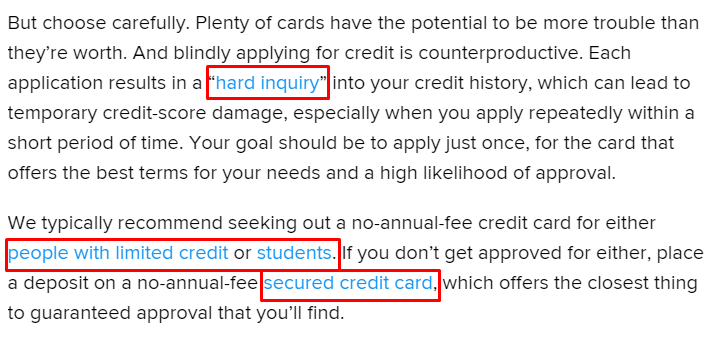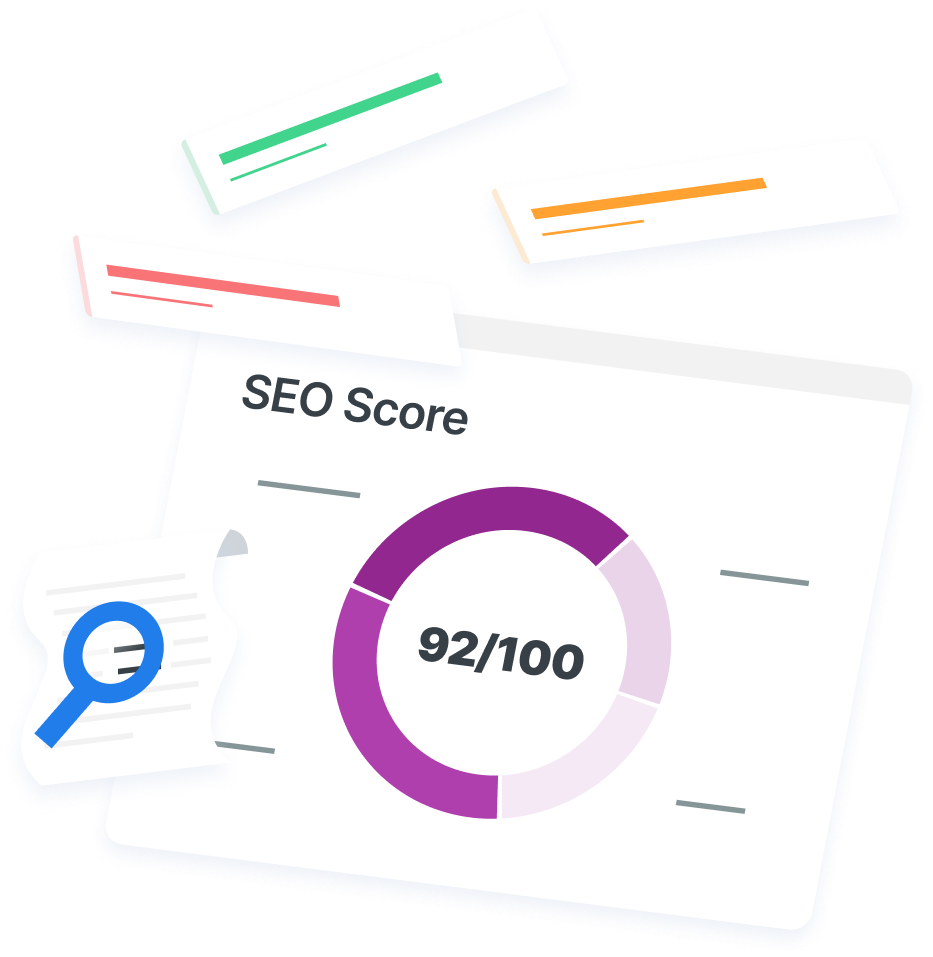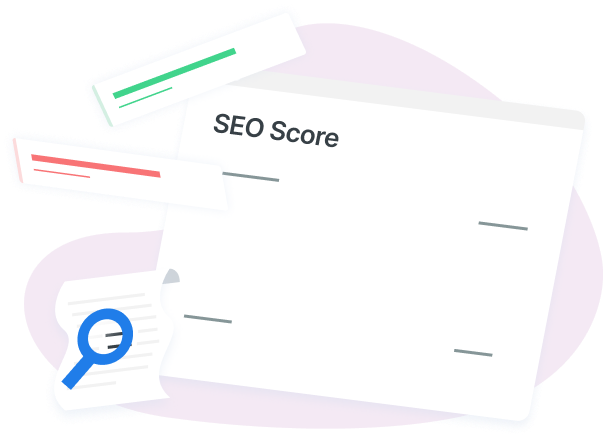-
 14 min. read
14 min. read
-
 Macy Storm
Macy Storm Senior Content Creator
Senior Content Creator
- Macy is a marketing writer with over five years of experience creating content for dozens of industries including food and beverage, home services, and education. She also specializes in creating SEO and PPC content. Her work has been featured by Search Engine Journal, HubSpot, Entrepreneur, Clutch, and more. In her free time, Macy enjoys trying new crafts and reading comic books.
You can’t eat before going swimming, or you’ll cramp up. Carrots can improve your vision. Lighting doesn’t strike the same place twice.
What do all these statements have in common? They’re all myths. There’s no evidence that you’ll get muscle cramps if you eat before swimming or that carrots keep you from getting glasses.
The Empire State Building gets struck by lightning an average of 25 times a year, so lightning can definitely strike the same place twice. Another topic that carries some myths of its own? Search engine optimization (SEO).
Many SEO myths come from Google’s secrecy about how the algorithm ranks sites in search results. On this page, we’ve got quite a few SEO myths we want to debunk for you. We also have a video where we bust seven common digital marketing myths.
Keep reading to learn about 12 common SEO myths and get the real facts about each.
P.S. Want to keep up with the latest SEO facts and tips?
Subscribe to Revenue Weekly to get valuable marketing insight that you can put into action for your business!
Looking for an all-in-one SEO audit tool? You’ve found it.
SEO Checker provides data on key metrics to give you:
- Complete SEO score
- Content Grade
- Site Speed Analysis
- and more.

SEO myth #1: You don’t need to conduct keyword research
One of the first misconceptions of SEO is that you don’t need to conduct keyword research. Many people will say that if you think of a relevant keyword for your page, you don’t need to research it or find additional supplemental keywords. However, just thinking a keyword is sufficient to use in your content isn’t enough.
If you don’t have any data about the keyword, you won’t have the numbers to back up the fact that it’s a good keyword to target. Additionally, without keyword research, your page may only rank for one keyword, limiting its visibility. You need to conduct keyword research to ensure you choose relevant keywords that will drive traffic to your page.
Fast facts about keyword research:
- Keyword research will help you see valuable data, like traffic volume, that can help you determine if it’s a valuable keyword for your page.
- Keyword research will help you find additional keywords that will help you rank for supplementary searches
SEO myth #2: The more you use keywords on a page, the better it will rank
One of the most common SEO myths is that the more you integrate keywords on your pages, the more your ranking will improve. Many people still believe that if you want to rank, you need to use the keyword as often as possible throughout your content, so that Google understands your page is relevant to the query that a user searched. The reality, however, is that integrating your keywords too often leads to keyword stuffing, which is a negative ranking factor.
Google could penalize your site for overusing a keyword because it views this strategy as a black hat SEO technique. Black hat SEO techniques go against Google’s guidelines, so using any of those tactics will hurt your site’s ranking.
Fast facts about keyword integration:
- You want your keyword density to stay below 3%.
- You can calculate your keyword density by taking the total number of times you used the keyword and dividing it by the number of words on the page and multiplying the result by 100 to get a percentage. So, if you used your keyword 20 times on a 2000-word page, your keyword density is 1%.
- Keywords should be placed in the copy where they fit and flow naturally. Don’t force keywords on the page just to try to get your page to rank.
SEO myth #3: You just need to target the right keywords — content doesn’t matter
One of the most common misconceptions about SEO is that it’s all about keyword targeting. Many people believe that if you target the keywords you want to rank for, simply by sprinkling them through low-quality writing, the content on the page doesn’t matter as much. In other words, you’ll just rank in the search results because you’re optimizing for that keyword, right?
Wrong. The content on your pages plays a critical role in helping you rank in the search results. If you aren’t delivering high-quality content, you won’t rank as well in the search results, no matter how well you optimize for search engines.
You won’t successfully engage leads either, because you won’t provide the most compelling content on your page. If your audience doesn’t find the information they need, they will leave your page and increase your bounce rate. This action sends a negative signal to Google that can hurt your SEO ranking.
Fast facts about creating content:
- Google looks at the user’s experience on your content pages when determining your ranking. You must provide your audience with valuable information, so leads remain on your site. Longer dwell time sends a positive signal to Google that your page is relevant, and it will rank you higher.
- Content needs to be user-friendly — it entails breaking up text into smaller paragraphs, integrating visuals, and limiting jargon on your pages.
- Create content for your audience, not search engines. Like we stated prior, Google takes the user’s experience into account. So, if you’re creating content that engages your audience, it will help your ranking.
SEO myth #4: Having a sitemap improves your SEO ranking
Next on our list of SEO myths regards sitemaps. Many people believe that if you have a sitemap, it’ll instantly improve your SEO rankings and help you get to the top of the search results. The reality, however, is that sitemaps don’t guarantee that you’ll rank higher in search results.
They don’t have any direct impact on improving your ranking. However, sitemaps are still a crucial part of your website — and you should create one to help Google find and index your pages. A sitemap provides a guide for Google to crawl pages on your site.
Though a sitemap won’t help you improve rankings, it will help Google crawl and index pages so you can appear in search results.
Fast facts about sitemaps:
- Sitemaps help Google crawl your site more effectively and efficiently.
- Sitemaps provide Google with information like when the page was last updated or how often the page changes.
- Sitemaps help Google discover newly added pages on your site.
SEO myth #5: You don’t need to worry about your title tag or meta description
Your title tag and meta description are the two bits of information that your audience sees first in the search results. One of the most common SEO myths surrounding these two tags is that you don’t need to optimize them.  If you neglect to optimize these two elements, you won’t rank as highly in search results or drive as much traffic to your page.
If you neglect to optimize these two elements, you won’t rank as highly in search results or drive as much traffic to your page.
Search engines and users use these two elements to determine the relevancy of your page to their query. Without optimizing these elements, your audience and search engines may not know if your page is relevant to the search results.
Fast facts about title tags and meta descriptions:
- Your title tag should be no more than 60 characters.
- Your meta description should be no more than 160.
- Your title tag and meta should include your core keyword.
SEO myth #6: You don’t need to create content often
Content creation is a critical component of SEO. One of the most common SEO myths around content creation is that you don’t need to create it often. You may have heard that you can post a blog occasionally and that it’s enough to help you rank or keep your ranking.
However, this is an SEO myth. If you want to make the most of your SEO, you need to create content often. When you create and post content habitually, you create new ways for leads to discover your website, which means more traffic for your business.
Not only that, but more content means you can target more keywords. That’s why 60% of marketers create at least one piece of new content daily — more content means more avenues for leads to stumble across your company.
Fast facts about content creation:
- Using a content calendar will help you stay on top of how often you’re publishing content. It will enable you to keep track of when you create content and when you’re set to publish it.
- Blogging is one of the most effective ways to drive traffic — 82% of marketers who blog regularly see a positive return on investment (ROI) from inbound marketing
SEO myth #7: You should believe an SEO company when they guarantee fast results
Next on our list of SEO misconceptions has to do with SEO companies. If you’ve ever investigated SEO services, you may notice that some companies that offer guarantee getting you the first position or offer to get you to the top fast. This offer is one of the most dangerous SEO myths.
You shouldn’t put your trust in a company that guarantees they can get your company to rank in the 1st position fast. If they promise these results, they’re more than likely using black hat SEO techniques that go against Google’s guidelines.
Fast facts about guaranteed rankings:
- There is no way for a company to guarantee they can get you ranking in the first position in a short amount of time if they’re using the proper techniques.
- SEO takes time to develop results, so any company that promises instant results is one to shy away from choosing.
- An SEO company should use techniques like keyword research, link building, and creating content.
SEO myth #8: Backlinks are great no matter where they come from
When you learn about SEO, you learn that backlinks are a big part of SEO. Backlinks are links from other sites that direct people back to your pages. These links are critical to helping you improve your site’s ranking.
One of the most common SEO misconceptions regarding backlinks, though, is that all links you get to your site are great no matter who links to you. The reality, however, is that not all backlinks are great for your SEO. Bad backlinks are links from untrustworthy sites.
These sites don’t have credibility, so having a link or multiple links to them makes your site seem less credible. It can damage your ranking and make your site seem untrustworthy. If you have multiple spammy links, you may also lead Google to believe that you’re buying links (a black hat SEO technique), which can lead your website to get penalized.
Fast facts about backlinks:
- They should always come from credible sites. Getting links from industry authorities is even better.
- You can remove bad backlinks from your profile by reaching out to the company that linked to you and asking them to remove it or by disavowing the link in Google Search Console.
SEO myth #9: You should only focus on earning backlinks
Backlinks are essential to helping your SEO, but they aren’t the only links that matter for your SEO. One of the most common SEO myths is that you should only focus on earning backlinks. Realistically, while you focus on backlinks, you should also focus on internal links.
Internal links are links to other pages on your site. They are critical for keeping leads engaged on your site, and when leads spend more time on your site, it sends a positive signal to Google that your site is relevant to the search results.
Fast facts about internal linking:
- Internal links help Google discover, crawl, and index pages on your site.
- The anchor text for your internal link is relevant because it tells users and search engines what to expect when they click on the link.

SEO myth #10: You only need to do SEO once
One of the most common SEO myths is that it’s a once and done strategy. Some people believe that you just need to optimize your site once for SEO, and that’s all it takes. This perception is one of the biggest misconceptions about SEO that can damage your business.
If you only do SEO once, you won’t see long-term results from it. You may see some results from the initial optimization, but as time goes on, you won’t maintain rankings and drive valuable traffic. To get the most out of SEO, you’ll want to do it continuously.
It may take a few weeks or months to show results, but when you keep optimizing your campaign, it will drive better results over time.
Fast facts about SEO:
- SEO is a long-term strategy that requires constant optimization and work to maintain rankings and traffic flow.
- Continually optimizing your SEO will drive more traffic, leads, and sales for your business.
SEO myth #11: If you don’t get the first position, your SEO is failing
Many people implement an SEO campaign expecting that they’ll get the first position for every keyword that they target. While it’s an SEO goal to earn the top position, your webpage may not make it into that top position all the time. One of the most common misconceptions about SEO is that if you aren’t ranking in this first position, your SEO is failing.
As a result, many companies will cancel their SEO campaign or question if it’s valuable to their business. It’s important to know that just because you aren’t ranking in the top of the search results, doesn’t mean your SEO isn’t working. You may need to refine your campaign, or your campaign may just need more time to develop results.
And in some cases, your competition may just have more relevant content for a keyword, so you may need to reoptimize your content to provide more relevant information!
Fast facts about the first position:
- There is no guarantee that an SEO campaign will earn you the first position in search every time (but it doesn’t mean your SEO is failing!)
- SEO can take weeks or months to show results, so don’t be surprised if you don’t see results right away.
- Focus on creating pages that fit the search intent and provide all the information your audience needs, so you have a better shot at ranking for the top positions.
SEO myth #12: Your mobile site doesn’t impact your ranking
Another common misconception about SEO is that your mobile site doesn’t impact your ranking. Many companies believe that if your desktop site is in good shape, you don’t need to worry about your mobile site. Considering Google rolled out mobile-first indexing in 2018, that couldn’t be further from the truth.
Google takes the mobile version of your site into account when ranking your pages. If you don’t have a mobile-friendly site, you won’t rank as well in the search results. It’s crucial that your site provides a fantastic experience for all users — regardless of device —if you want to have a chance at ranking at the top of the search results.
Fast facts about mobile:
- 76% of consumers shop on a smartphone, so you need a mobile-friendly site to ensure they have a positive shopping experience.
- You can make your site mobile-friendly by implementing responsive design into your web design.
Last myth: You must do SEO on your own
SEO is an intricate and complex marketing strategy, but you’ll reap many benefits when you take the time to do it right. Implementing an SEO strategy can feel overwhelming, but you don’t have to do it on your own. You can rely on a digital marketing company, like WebFX, to help you manage your campaign.
We’re a full-service digital marketing company that specializes in SEO. With over a decade of experience, you can count on us to run an SEO campaign that drives success. In the past five years, we’ve driven over $6 billion in sales and over 24 million leads for our clients.
We know how to create SEO campaigns that help our clients thrive online and drive real results. Ready to see how we can help you create an effective SEO strategy? Contact us online or call us today at 888-601-5359 to speak with a strategist about our SEO services.
-
 Macy is a marketing writer with over five years of experience creating content for dozens of industries including food and beverage, home services, and education. She also specializes in creating SEO and PPC content. Her work has been featured by Search Engine Journal, HubSpot, Entrepreneur, Clutch, and more. In her free time, Macy enjoys trying new crafts and reading comic books.
Macy is a marketing writer with over five years of experience creating content for dozens of industries including food and beverage, home services, and education. She also specializes in creating SEO and PPC content. Her work has been featured by Search Engine Journal, HubSpot, Entrepreneur, Clutch, and more. In her free time, Macy enjoys trying new crafts and reading comic books. -

WebFX is a full-service marketing agency with 1,100+ client reviews and a 4.9-star rating on Clutch! Find out how our expert team and revenue-accelerating tech can drive results for you! Learn more
Try our free SEO Checker
Boost your site’s search performance with our free SEO Checker. Analyze your website for optimization tips on titles, headers, content, speed, and more. Get a free report now to enhance rankings on Google, Bing, Yahoo, and beyond!

Table of Contents
- SEO Myth #1: You Don’t Need to Conduct Keyword Research
- SEO Myth #2: the More You Use Keywords on a Page, the Better It Will Rank
- SEO Myth #3: You Just Need to Target the Right Keywords — Content Doesn’t Matter
- SEO Myth #4: Having a Sitemap Improves Your SEO Ranking
- SEO Myth #5: You Don’t Need to Worry About Your Title Tag or Meta Description
- SEO Myth #6: You Don’t Need to Create Content Often
- SEO Myth #7: You Should Believe an SEO Company when They Guarantee Fast Results
- SEO Myth #8: Backlinks Are Great No Matter Where They Come from
- SEO Myth #9: You Should Only Focus on Earning Backlinks
- SEO Myth #10: You Only Need to Do SEO Once
- SEO Myth #11: if You Don’t Get the First Position, Your SEO is Failing
- SEO Myth #12: Your Mobile Site Doesn’t Impact Your Ranking
- Last Myth: You Must Do SEO on Your Own


How Is Your Website’s SEO?
Use our free tool to get your score calculated in under 60 seconds.
Try our free SEO Checker
Boost your site’s search performance with our free SEO Checker. Analyze your website for optimization tips on titles, headers, content, speed, and more. Get a free report now to enhance rankings on Google, Bing, Yahoo, and beyond!





